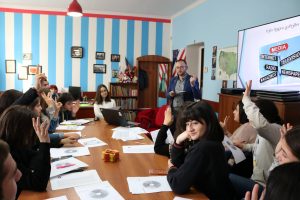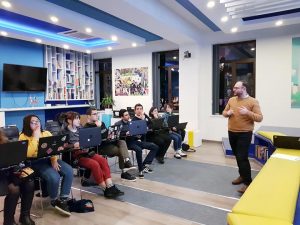 In Western Georgia, settled along the Black sea, Mamuka Saparidze is teaching citizens in his hometown of Batumi to be more savvy media consumers. Mamuka is the coordinator for programming and outreach at the American Corner Batumi, which supports a number of education initiatives including media and information literacy. Mamuka attended the 2017 news literacy training at Adam Mickiewicz University in Poznań, Poland and returned for the 2019 Global Conference to share demonstrations of his teaching. We were lucky to chat with him last month to learn more about his work and how he draws from a number of resources to adapt media literacy education for all ages of learners from primary school to adults in the mountainous regions of Georgia.
In Western Georgia, settled along the Black sea, Mamuka Saparidze is teaching citizens in his hometown of Batumi to be more savvy media consumers. Mamuka is the coordinator for programming and outreach at the American Corner Batumi, which supports a number of education initiatives including media and information literacy. Mamuka attended the 2017 news literacy training at Adam Mickiewicz University in Poznań, Poland and returned for the 2019 Global Conference to share demonstrations of his teaching. We were lucky to chat with him last month to learn more about his work and how he draws from a number of resources to adapt media literacy education for all ages of learners from primary school to adults in the mountainous regions of Georgia.
Mamuka has learned that tailoring teaching techniques for particular learners is important and sometimes it takes some trial and error to figure out what works best. Drawing on examples from other educators with similar media and information environments, he has honed lessons in tricky topics, like how statistics are manipulated, how information is cherry-picked for social media content, and how messages are constructed for persuasion. A great example he shared is one we can all relate to: teaching propaganda. After trying different ways of teaching about propaganda, he adapted the Irex model used by educators in Ukraine to help students better understand the difference between the kinds of emotionally-driven propaganda messages often shared in Georgia and other types of content.
When it comes to teaching children, Mamuka’s favorite technique is the “compass,” which he adapted for news literacy from a tool originally used by English as a second language educators. It helps learners think critically about information when they are emotionally triggered. He explained that it is a great analogy for helping students recognize when they are ‘lost’ in their understanding of content and how to navigate their way to comprehension. The method encourages students to travel the regions of the compass and ask:
North: Do I need to know this information
West: Is this worrisome information
East: Am I excited by this information?
South: What is my stance on this information?
Mamuka said this tool has been particularly helpful when helping young people navigate confusing or scary information about Coronavirus. This even works online, he  explains. “Online they would travel to different rooms – to the ‘Northern’ room and then to the ‘Southern’ room,” to discuss and consider the different media literacy questions. Mamuka also uses digital games, like those created by the Media Development Foundation, to incorporate digital literacy skills. “When it comes to kids it’s all about playing and kids are supposed to play. So, that’s the best option for them.”
explains. “Online they would travel to different rooms – to the ‘Northern’ room and then to the ‘Southern’ room,” to discuss and consider the different media literacy questions. Mamuka also uses digital games, like those created by the Media Development Foundation, to incorporate digital literacy skills. “When it comes to kids it’s all about playing and kids are supposed to play. So, that’s the best option for them.”
As for engaging adult learners, handouts, slides, and online tools like Kahoot and Mentimeter are helpful. Another resource Mamuka uses with older learners is a series of public service announcement style videos that illustrate complicated ideas like the variety of things that should be considered when selecting sources of information. These videos are tailored specifically to the experiences and culture with which adults in Georgia are already familiar. A great example of a PSA Mamuka helped create is this one about how images are framed, which can be easily understood even without sound.
It is important, explained Mamiuka, to include evolving concepts of news and journalism in media literacy lessons. For example, “civil journalism” or what is sometimes called ‘citizen journalism’ is an emerging alternative source of news information to state-run and state-influenced news content. He includes civil journalism as another pillar of information in the ‘neighborhood’ that can empower citizens to become the source of news information. He also cautions that civil journalists can also have a variety of motives for sharing content. “I always end the sessions with” “Compare, compare, and compare. Don’t believe just one particular source. If it’s too good to be true, check somewhere else.”
Having fallen in love with media while studying international relations, journalism, and mass communications in both undergrad and graduate study at Tbilisi State University, Mamuka draws a strong connection between citizenship and media literacy. He has since taken opportunities to travel to different countries learning how other educators are teaching media literacy and how he can best adopt what they share for his learners. A life-long learner, Mamuka encourages other media literacy educators to be the same.
 “One thing I would tell a younger educator in this field is that things are rapidly changing in the world and different trainings offer different perspectives. Constant development for trainers is very important. Everything is changing when it comes to the media. You must always be a learner as well as the educator.”
“One thing I would tell a younger educator in this field is that things are rapidly changing in the world and different trainings offer different perspectives. Constant development for trainers is very important. Everything is changing when it comes to the media. You must always be a learner as well as the educator.”
Well said, Mamuka.
If you would like to connect with Mamuka his passion for discourse, ethics, and all-things-media or learn more about his work in media literacy, be sure to follow the American Corner Batumi or email him at msaparidze@gmail.com.